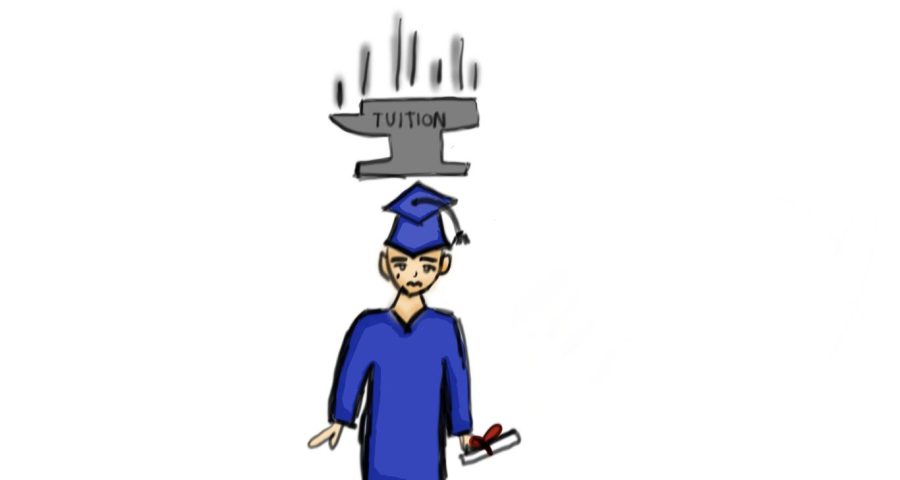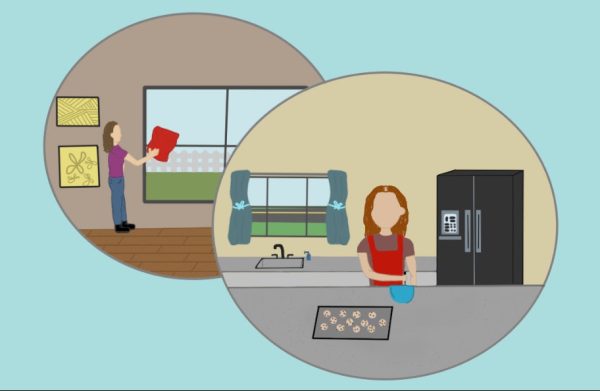Education is a human right
Students shouldn’t be riddled with debt once they graduate from college
June 4, 2022

Education is a human right.
Once education is treated as a privilege, the lines between education being an option or luxury becomes blurred. Options of grandeur should be limited to wants of extravagance, not education. Henceforth, it’s unacceptable that in order to be offered the chance to pursue a higher education, students must be a part of the upper class or be riddled with debt.
In a poll conducted by the Crusader, the week of April 21, it shows that out of 122 respondents, 26 students are struggling to finance college. This illustrates how the students of Bonita Vista High (BVH) are struggling to pay for a higher education and as a result, affects their mindset about attending college. According to Intelligent’s article, “1 in 3 recent high school grads skip college because it’s a waste of money” while “Thirty-four percent of young adults who aren’t currently enrolled in college say it’s because they can’t afford it.”
As college tuition rises to an insurmountable number, so does the worry that clouds students approaching their graduation date. When students decide that they want to go to a prestigious college but are unable to because of financial struggles, this becomes an injustice by allowing classist acts such as creating more opportunities for those with more income to occur.
“Quality in education means that every student gets the same resources and opportunities.” National Society Of High School Scholars (NSHSS) states. Making college free makes it accessible for more of the people who come from poverty to have an education. This increases the chances and promotes the idea that everyone will be able to get a higher education. Ultimately, the goal is to create equality within the education system.
In their article, “What is the typical debt load for graduates of four-year public universities?”, the Association of Public & Land Grant Universities states that, “Among those who borrow, the average debt at graduation is $25,921 — or $6,480 for each year of a four-year degree at a public university.”
Due to the average student graduating college with over a quarter of a hundred thousand dollars in debt, we are able to see how this number might seem small to some but a nightmare to others. Not to mention the amount fo years it takes for student to pay off their debt after their graduation and after obtaining their career.
“Those who borrow loans between $20,000 to $40,000 will usually take 20 years to pay,” Research.com states.
College should not come as a burden to those of the lower class nor as a privilege to those who have a better socioeconomic status than most. When students pursue a higher education, the last thing that should cross their mind at the young age of 17 or 18 should be their financial situation, rather they should be worrying about deadlines, assignments and normal teenage events.
To live as a student without debt is to have freedom and options. To live as a student without the constant worry of money is equality. — Mayah Cerecer
On the other hand, many students are seen as only teenagers; rebellious, edgy and rulebreakers.
According to College Raptor’s article, “Why College Should Be Free”, written by Ellen Anderson, “If higher education at public schools becomes free, it might appear to devalue a college degree. It might also lead to students cutting more classes or not trying because they don’t have to “get their money’s worth” when they aren’t paying for anything.”
Many rebuttals are in a hypothetical sense, meaning that they are based on ‘what if’ scenarios. For example, ‘What if college is free and students have no motivation to go to class?’ Even though colleges make students pay tuition, students are still evident to skip class and seen as not trying. However, many other students drop out because their financial situation never gave them a chance to prove themselves worthy of an education. Whether it be when applying for scholarships, receiving full rides from universities or other financial aid opportunities, tuition makes college a competitive sport.
According to Think Impact in their report, “College Dropout Rates”, “55% of college students struggle to find financial support for their studies. Consequently, 51% of college dropouts drop out because of the lack of money.”
The number one reason why student’s dropout of college is because of their financial struggles. With a more affordable and appropriate tuition, it ensures that lower class citizens and students can follow through with their commitment and their goals when entering a new stage in their life.
“Research shows that free tuition programs encourage more students to attend college and increase graduation rates, which creates a better-educated workforce and higher-earning consumers who can help boost the economy,” Kelly Dilworthe states in her article, “Should College Be Free? The Pros and Cons”. Essentially, by providing students with free college, society is also providing them with a safety net for their future.
To live as a student without debt is to have freedom and options. To live as a student without the constant worry of money is equality.The education system needs to do better to meet students’ needs rather than their own.












